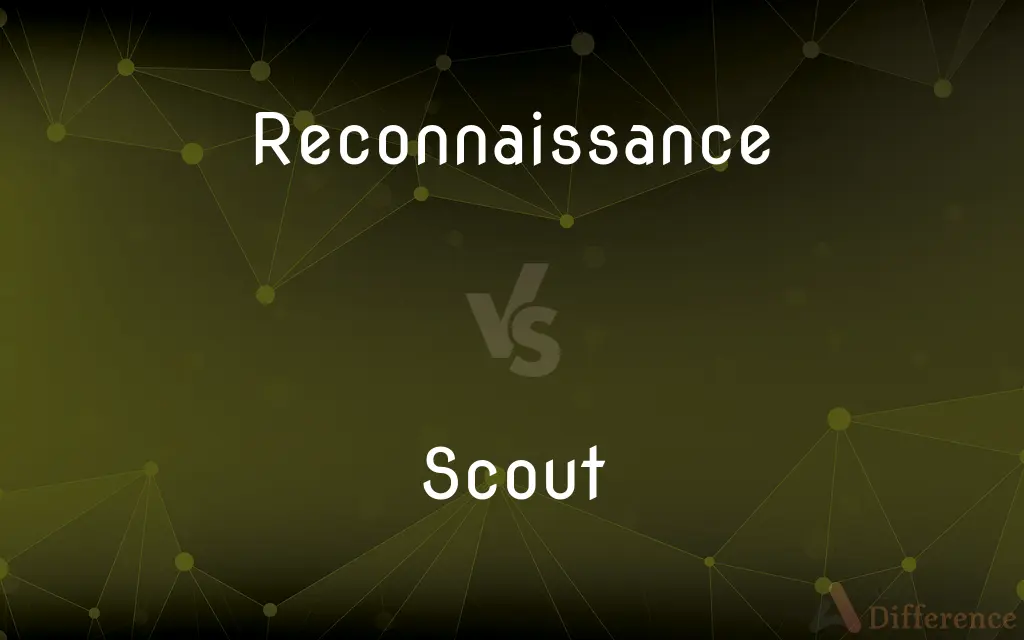Reconnaissance vs. Scout — What's the Difference?
By Tayyaba Rehman & Urooj Arif — Updated on April 14, 2024
Reconnaissance involves gathering information about an area, often for military purposes, while scouting can refer to exploring or investigating generally, including in sports or youth organizations.

Difference Between Reconnaissance and Scout
Table of Contents
ADVERTISEMENT
Key Differences
Reconnaissance is primarily a military term that involves the systematic observation of a region to gather intelligence, such as the activities or resources of an enemy. Whereas, scouting is a broader term that can apply to various fields including military, sports, and even academic research, where the focus is on general exploration and information gathering.
Reconnaissance missions are often secret and involve strategies to avoid detection and conflict, aimed at collecting specific data. On the other hand, scouting can be a more open activity and might not always carry the imperative of secrecy, such as a scout in sports identifying upcoming talents.
Reconnaissance often uses sophisticated technology like drones, satellites, or specialized reconnaissance aircraft to achieve its objectives. In contrast, scouting might simply involve individuals or teams on the ground with less emphasis on technological support.
Reconnaissance activities are crucial for military tactics and security, providing detailed and critical intelligence that informs military decisions. While, scouting can be as simple as observing and reporting back without the intense analysis often required in reconnaissance.
Reconnaissance requires specific skills and training, particularly in how to gather and interpret the data under potentially hostile conditions. Whereas, scouting skills can vary widely depending on the context, from a sports scout analyzing player performances to a youth scout learning about nature.
ADVERTISEMENT
Comparison Chart
Definition
Gathering of information for military purposes
General exploration or investigation
Primary Context
Military
Various, including military, sports, youth groups
Focus of Activity
Gathering intelligence about the enemy or territory
Exploring or investigating broadly
Use of Technology
High (drones, satellites)
Low to moderate
Skills Required
Specialized military training
Depends on the context (e.g., sports, outdoors)
Compare with Definitions
Reconnaissance
The act of scouting out in detail, particularly for military goals.
Nighttime reconnaissance missions were crucial during the operation.
Scout
Someone who searches for talent or information.
The scout recommended a promising young player to the team's coach.
Reconnaissance
An exploratory action or survey to gather data.
The geologists conducted a reconnaissance to understand the area's mineral composition.
Scout
To survey or observe in order to gather data.
The journalist scouted the area for potential stories.
Reconnaissance
Military observation of a region to locate an enemy or ascertain strategic features.
The army dispatched a drone for aerial reconnaissance of the area.
Scout
To explore an area to obtain information.
We scouted the location before setting up the camp.
Reconnaissance
Information gathering for strategic purposes.
The reconnaissance mission provided critical data on the enemy's movements.
Scout
A member of a scouting organization, such as the Boy Scouts or Girl Scouts.
Scouts learn various outdoor skills during their camping trips.
Reconnaissance
A preliminary survey to gain general insights.
The team did a reconnaissance of the retail market before launching the product.
Scout
A person who provides information on weather, terrain, and other conditions.
The mountain guide acted as a scout for the climbing expedition.
Reconnaissance
In military operations, reconnaissance or scouting is the exploration of an area by military forces to obtain information about enemy forces, terrain, and other activities. Examples of reconnaissance include patrolling by troops (skirmishers, long-range reconnaissance patrol, U.S. Army Rangers, cavalry scouts, or military intelligence specialists), ships or submarines, manned or unmanned reconnaissance aircraft, satellites, or by setting up observation posts.
Scout
To spy on or explore carefully in order to obtain information; reconnoiter.
Reconnaissance
An inspection or exploration of an area, especially one made to gather military information.
Scout
To observe and evaluate (a talented person), as for possible hiring.
Reconnaissance
The act of scouting or exploring (especially military or medical) to gain information.
Scout
To search as a scout
Scout around for some gossip.
Reconnaissance
The act of reconnoitering; preliminary examination or survey.
Scout
To search for talented people
Scouts for a professional basketball team.
Reconnaissance
The act of reconnoitring (especially to gain information about an enemy or potential enemy);
An exchange of fire occurred on a reconnaissance mission
Scout
To reject with disdain or derision.
Scout
One that is dispatched from a main body to gather information, especially in preparation for military action.
Scout
The act of reconnoitering.
Scout
A watcher or sentinel.
Scout
One who is employed to discover and recruit talented persons, especially in the fields of sports and entertainment.
Scout
(Sports) One who is employed to observe and report on the strategies and players of rival teams.
Scout
A member of the Boy Scouts.
Scout
A member of the Girl Scouts.
Scout
(Informal) An individual; a person
A good scout.
Scout
Chiefly British A student's male servant at Oxford University.
Scout
A person sent out to gain and bring in tidings; especially, one employed in war to gain information about the enemy and ground.
Scout
An act of scouting or reconnoitering.
Scout
A member of any number of youth organizations belonging to the international scout movement, such as the Boy Scouts of America or Girl Scouts of the United States.
Scout
A person who assesses and/or recruits others; especially, one who identifies promising talent on behalf of a sports team.
Scout
A person employed to monitor rivals' activities in the petroleum industry.
Scout
A housekeeper or domestic cleaner, generally female, employed by one of the constituent colleges of Oxford University to clean rooms; generally equivalent to a modern bedder at Cambridge University.
Scout
A domestic servant, generally male, who would attend (usually several) students in a variety of ways, including cleaning; generally equivalent to a gyp at Cambridge University or a skip at Trinity College, Dublin.
Scout
A fielder in a game for practice.
Scout
A fighter aircraft.
Scout
(radiography) A preliminary image that allows the technician to make adjustments before the actual diagnostic images.
Scout
(informal) Term of address for a man or boy.
Scout
(dated) A swift sailing boat.
Scout
The guillemot.
Scout
To explore a wide terrain, as if on a search; to reconnoiter.
Scout
(transitive) To observe, watch, or look for, as a scout; to follow for the purpose of observation, as a scout.
Scout
(transitive) To reject with contempt.
To scout an idea or an apology
Scout
(intransitive) To scoff.
Scout
A swift sailing boat.
So we took a scout, very much pleased with the manner and conversation of the passengers.
Scout
A projecting rock.
Scout
A person sent out to gain and bring in tidings; especially, one employed in war to gain information of the movements and condition of an enemy.
Scouts each coast light-armèd scour,Each quarter, to descry the distant foe.
Scout
A college student's or undergraduate's servant; - so called in Oxford, England; at Cambridge called a gyp; and at Dublin, a skip.
Scout
A fielder in a game for practice.
Scout
The act of scouting or reconnoitering.
While the rat is on the scout.
Scout
A boy scout or girl scout (which see, above).
Scout
To reject with contempt, as something absurd; to treat with ridicule; to flout; as, to scout an idea or an apology.
Scout
To observe, watch, or look for, as a scout; to follow for the purpose of observation, as a scout.
Take more men,And scout him round.
Scout
To pass over or through, as a scout; to reconnoiter; as, to scout a country.
Scout
To go on the business of scouting, or watching the motions of an enemy; to act as a scout.
With obscure wingScout far and wide into the realm of night.
Scout
A person employed to watch for something to happen
Scout
Someone employed to discover and recruit talented persons (especially in the worlds of entertainment or sports)
Scout
Someone who can find paths through unexplored territory
Scout
Explore, often with the goal of finding something or somebody
Common Curiosities
How does reconnaissance technology differ from tools used in scouting?
Reconnaissance often involves advanced technology like satellites and drones, while scouting can use simpler tools like binoculars or basic digital cameras.
What does a scout do in sports?
In sports, a scout observes and evaluates players to identify emerging talents and recommend recruits for teams.
Can scouting be considered a form of reconnaissance?
Yes, scouting can be considered a form of reconnaissance if it is focused on gathering specific information in a detailed manner, though it generally has a broader and less secretive connotation.
How does the immediacy of information differ between reconnaissance and scouting?
In reconnaissance, the immediacy of information is often critical, as it can directly influence military operations and strategies. In scouting, the urgency of information can vary and is often less critical.
What is the primary purpose of reconnaissance?
The primary purpose of reconnaissance is to gather detailed and specific information about an enemy or a geographic area, mainly for military purposes.
How do reconnaissance missions handle the risk of detection?
Reconnaissance missions often use stealth technology, careful planning, and sometimes decoys to minimize the risk of detection and ensure the safety of operatives.
Is scouting limited to the military or sports?
No, scouting is not limited to military or sports. It also applies to other areas such as scouting locations for film production, scouting in business for market research, and scouting in youth organizations like the Boy Scouts or Girl Scouts.
What are the essential skills for a military reconnaissance operative?
Essential skills include stealth tactics, navigation, intelligence analysis, and the ability to operate various reconnaissance technologies effectively.
What historical examples illustrate the importance of reconnaissance?
Historical examples include reconnaissance activities during World War II where both Allied and Axis powers used various forms of reconnaissance to gain advantages, such as the use of spy planes and radar.
What environments are common for reconnaissance missions?
Reconnaissance missions are common in diverse environments ranging from urban settings to dense forests, as they need to adapt to where strategic or military information is required.
What kind of training do scouts receive?
Scouts receive training based on their specific roles; for instance, sports scouts might study player analytics and talent evaluation, while youth scouts learn survival skills, first aid, and teamwork.
Are there any legal or ethical considerations unique to reconnaissance?
Yes, military reconnaissance often involves legal and ethical considerations, particularly regarding the sovereignty of other nations and the legality of surveillance techniques.
What tools are commonly used in scouting outside of sports?
Common tools for scouting outside of sports include maps, compasses, standard and digital cameras, and sometimes drones for aerial views, especially in scouting for real estate or film locations.
What is the impact of technology on modern scouting?
Technology has significantly enhanced modern scouting, allowing scouts to use databases, video analysis, and advanced metrics to evaluate talent, especially in sports and market research.
Can anyone be a scout?
Yes, anyone with keen observation skills and specific knowledge in a field can act as a scout, whether it's for talent in sports, youth scouting, or location scouting in various industries.
Share Your Discovery

Previous Comparison
Compiler vs. Interpreter
Next Comparison
Crunked vs. CronkedAuthor Spotlight
Written by
Tayyaba RehmanTayyaba Rehman is a distinguished writer, currently serving as a primary contributor to askdifference.com. As a researcher in semantics and etymology, Tayyaba's passion for the complexity of languages and their distinctions has found a perfect home on the platform. Tayyaba delves into the intricacies of language, distinguishing between commonly confused words and phrases, thereby providing clarity for readers worldwide.
Co-written by
Urooj ArifUrooj is a skilled content writer at Ask Difference, known for her exceptional ability to simplify complex topics into engaging and informative content. With a passion for research and a flair for clear, concise writing, she consistently delivers articles that resonate with our diverse audience.














































